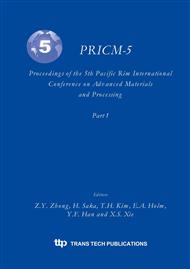p.2463
p.2469
p.2473
p.2477
p.2481
p.2485
p.2489
p.2497
p.2501
Degrading Mechanism on Hydrogen Absorbing-Desorbing Cycle Durability of V- and Ti-Cr-Based BCC-Type Solid Solutions
Abstract:
V- and Ti-Cr-based solid solutions with body-centered cubic (BCC) type structure were investigated on hydrogen absorbing-desorbing cycle durability by using H2 without and with 10ppm CO (Hereafter they are expressed as H2 and CO/H2, respectively.). The solid solutions showed excellent cycle durability even after 1,000 cycles of hydrogen absorption and desorption under H2 atmosphere. On the other hand, the capacities decreased rapidly during hydrogen absorbing-desorbing cycles in the beginning of the tests under CO/H2 one. The solutions were not disproportionate though the stable monohydride phase increased, that is, stored hydrogen increased gradually. It was observed that not only microscopic pulverization but also nanoscopically fine-grained crystallization occurred in degraded particles. It is considered that the impurity CO influences bulk structure as an intrinsic factor as well as surface area as an extrinsic factor as regarded as ever. This causes the degradation of the cycle capacities.
Info:
Periodical:
Pages:
2481-2484
Citation:
Online since:
January 2005
Authors:
Price:
Сopyright:
© 2005 Trans Tech Publications Ltd. All Rights Reserved
Share:
Citation:


